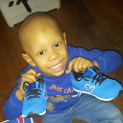Assess the activity of ABT-737 as a single agent against neuroblastoma cell lines grown in cell culture
Neuroblastoma is a solid malignant tumor of childhood that occurs along the spinal cord and adrenal gland and is often aggressive and difficult to cure. While most high-risk neuroblastoma patients initially respond well to chemotherapy, more than 50% of those patients ultimately die of neuroblastoma that recurs and becomes resistant to currently used chemotherapy. The bcl-2 family member proteins bel-xl and bel-2 are inhibitors of apoptosis (programmed cell death) and higher levels of bcl-2 proteins are found in many human cancers, including neuroblastoma, making them potential drug targets. ABT-737 is a new small-molecule drug that is able to bind to and inhibit anti-apoptotic bcl-2 family proteins.
We plan to assess the activity of ABT-737 as a single agent against neuroblastoma cell lines grown in cell culture, as well as assess whether it has an additive or synergistic ability to kill drug-resistant neuroblastoma cells when used in combination with other chemotherapeutic agents. These data will allow us to select the best drug combinations to test ABT-737 on neuroblastomas grown as tumors in mice. We also plan to determine the mechanisms in neuroblastoma cells of response or resistance to ABT-737, including whether the anti-tumor effect of ABT-737 is dependent on oxygen levels in tumor tissue, can occur in neuroblastoma cells that have mutated the p53 tumor suppressor gene, and we will measure the level of expression of the bcl-2 family proteins in drug-sensitive and drug-resistant neuroblastoma cell lines. We will also determine the sequence of events at the molecular level leading to cell death induced by ABT-737. ABT-737 is a promising new drug for which we have the opportunity to conduct preclinical studies and potentially develop phase I clinical trials for pediatric patients with neuroblastoma.

